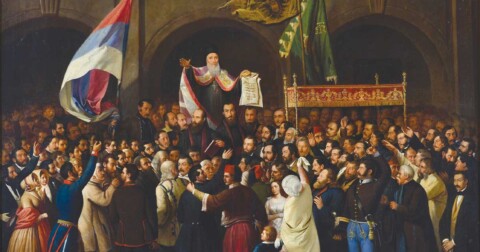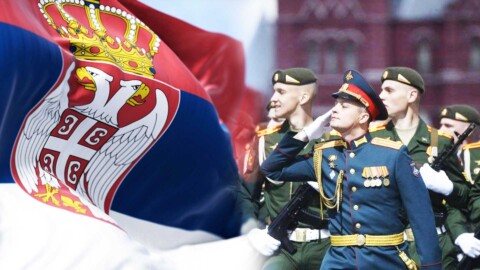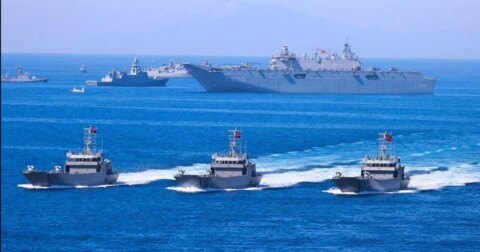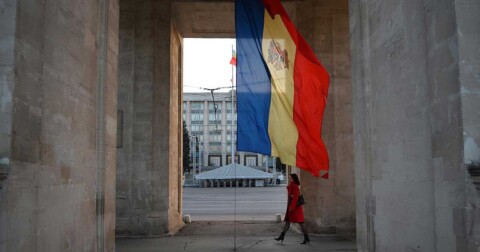Hungary is no longer merely a bystander but an active player shaping the evolving world order. Its “Eastern Opening” strategy, the rebuilding of ties with the United States, and the strengthening of a Balkan axis have elevated the country to a strategic position that goes beyond its regional role—and may even make it one of Europe’s key foreign policy winners. But this trajectory carries a major potential pitfall.
The transformation of the global order is accelerating. A more multipolar world is taking shape. “The gravitational center of the world economy… is once again shifting East,” Prime Minister Viktor Orbán emphasized at the Eurasia Forum last year, noting how Asian nations have emerged as independent economic and political power centers. In this context, Donald Trump’s victory in the 2024 U.S. presidential election marked a significant shift in Hungary’s international positioning. During Trump’s first term, Hungary and the United States maintained a notably positive relationship. Now, with the Republicans back in power, bilateral ties have regained momentum, showing signs of improvement after years of tension.
Orbán Viktor stands to benefit politically from having been the first European leader to endorse Trump in 2016—and having backed the right horse again in 2024. This alignment opens up major opportunities: significant U.S. investments are expected to arrive, and Trump has expressed support for Hungary’s efforts to mediate peace in the war in Ukraine. According to Balázs Orbán, the Prime Minister’s political director, Trump’s return is not only crucial for peace but could also pave the way for a new strategic agreement between Hungary and the U.S.—an initiative that is already taking shape. Although the Biden era saw sharp disagreements on issues like Ukraine, migration, and gender policies, the foundations of military and economic cooperation remained intact. Now the stage is set to elevate these ties to a higher strategic level.
A BRIDGE TO THE EAST
Hungary’s “Eastern Opening” policy, launched in 2010, has borne tangible fruit—particularly in its relationship with China. In May 2024, Chinese President Xi Jinping visited Budapest, and the two sides signed a declaration establishing a comprehensive strategic partnership. Beijing appreciates that Hungary firmly adheres to the “One China” principle, while in return, it supports Hungary’s sovereign development path. Xi emphasized that China’s Belt and Road Initiative aligns fully with Hungary’s Eastern Opening strategy, signaling even deeper cooperation in trade, finance, and development—especially in landmark projects like the Budapest–Belgrade railway.
China’s economic footprint in Hungary has expanded dramatically. One of the key indicators of the Eastern Opening’s success is that the share of FDI from Eastern countries has tripled since 2010, now accounting for 34% of total foreign investment. Chinese corporations continue to announce major investments: Hungary aims to serve as a geographic bridge where East meets West. This is exemplified by the co-existence of Western and Eastern automotive firms, building an integrated ecosystem for electric vehicle production.
Chinese EV giant BYD launched its first European factory in Hungary, while battery producer CATL is constructing a massive gigafactory in Debrecen. These moves show Hungary’s strong positioning within global supply chains—on both sides. The result: never before have Hungarian–Chinese ties been so close. Regular high-level meetings, growing trade, and shared infrastructure projects confirm that the Eastern Opening has evolved into a strategic partnership with Beijing.

MAINTAINING TIES WITH RUSSIA
Despite geopolitical storms, Hungary has preserved its relations with Russia, continuing to assert its national interests. In the fall of 2023, Orbán met with President Vladimir Putin during a forum in Beijing, reaffirming cooperation in the energy sector. Russian gas and oil supplies, along with the Paks II nuclear project, remain on the agenda. While most EU countries have sought to isolate Moscow, Hungary maintained its long-term gas contracts and did not halt nuclear development—underlining that, from Budapest’s viewpoint, reliable energy supply is a key political priority.
At his meeting with Putin, Orbán reiterated the need for peace, stressing that “ending the sanctions and the fighting is crucial for the whole continent—and for Hungary in particular.” This anti-war stance has long been a hallmark of Hungarian foreign policy. Budapest consistently advocates for a ceasefire and negotiations, in contrast to the EU mainstream, which has leaned toward prolonging the conflict.
For Hungary, Russia remains an indispensable player in global power dynamics. Western sanctions have failed to weaken Moscow militarily or economically. Accordingly, Hungary has tried to steer clear of great-power confrontations and maintain pragmatic relations with Russia. This careful balancing act now appears more valid than ever: Trump’s return has revived U.S.–Russia dialogue, and even the announcement of a possible Trump–Putin meeting caused European gas prices to fall.
With a war-ending peace potentially on the horizon, Hungary’s diplomatic insistence on peace may be vindicated. The country could play a key role in Europe’s post-war economic recovery—leveraging its preserved ties with Moscow.
THE BALKAN ALLIANCE: THE ORBÁN–VUČIĆ AXIS
Orbán has also worked to build alliances in Hungary’s immediate neighborhood—particularly in the Western Balkans, which he sees as a crucial buffer zone. His central partner in this effort is Serbian President Aleksandar Vučić, with whom he has developed a uniquely close relationship. They meet regularly, and Orbán has been a consistent advocate of Serbia’s EU accession, urging Brussels to speed up the negotiations. Belgrade has responded with gratitude.
This partnership is now institutionalized. In 2023, Hungary and Serbia signed a strategic agreement covering defense and energy cooperation, including joint military projects and infrastructure development. The two leaders often coordinate their positions on regional issues. Both oppose sanctions against Russia—Serbia has refrained from imposing penalties, and Hungary has resisted additional EU sanctions. In effect, they form a joint bloc leaning toward Moscow, drawing criticism from the West.
They share similar views on Kosovo, with Orbán openly supporting Serbia’s position.
HUNGARY IN THE GRIP OF GLOBAL POWERS
Today, Hungary finds itself at the intersection of a multipolar world order. Orbán’s government pursues a declaredly sovereign foreign policy: it seeks positive relations with all major global powers and refuses to serve as a subordinate within any geopolitical bloc. A central pillar of this approach is Hungary’s bridge role—linking East and West, which provides the country with a unique strategic position and a certain degree of autonomy within the EU.
Yet this relative independence is often perceived as a threat in Brussels.
Unexpectedly, 2023–2024 brought a major twist in Hungarian domestic politics. Péter Magyar, a new opposition leader, emerged with a clear pro-Western platform that directly challenges Orbán’s Eastern Opening. He rose to prominence with surprising speed: in the June 2024 European Parliament elections, his party, TISZA, captured around 30% of the vote (seven seats), eclipsing Hungary’s traditional opposition forces. Since then, he has become the main challenger to the governing Fidesz party and, according to some polls, has even overtaken it.
Magyar is actively cultivating international alliances. Following the election, he joined the European People’s Party (EPP)—the same group Fidesz left years ago. In both messaging and action, he promises a clean break with Orbán’s geopolitical course: he supports Ukraine’s sovereignty, condemns Putin’s war, and enjoys open support from key EU leaders. EPP President Manfred Weber considers him a close ally, and the two have held joint press conferences in Strasbourg. The European press now calls him “Brussels’ man.”
As a result, the 2026 parliamentary election will in part become a referendum on Hungary’s foreign policy direction: will the country stay the course with Orbán’s geopolitical strategy—or pivot toward Brussels, led by Péter Magyar?





